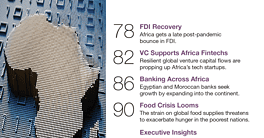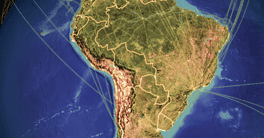Forget remittances. The best new tool for funding Africa may be bonds marketed to African expats.
When Nigerian expatriates soaked up the lion’s share of a $300 million international bond issue last year, it prompted speculation whether African countries might be ready to tap the savings of citizens living abroad for a significant portion of their financing needs.
“In the last couple of decades, there has been interest in how the diaspora could help finance infrastructure in Africa,” says Michael Famoroti, chief economist at Vetiva Capital in Lagos. The World Bank and the African Development Bank both issued reports that discussed this source of funds at the start of this decade. Expatriates already contribute to national development through remittances, to the tune of $30 billion a year in sub-Saharan Africa, according to Famoroti. This money is generally sent directly to family members to fuel consumption or small-scale investments.
So-called diaspora bonds give them another avenue to invest back home. “For small savers, they will probably get a better yield, if they are comfortable with the risk, than they would with a mutual fund in the U.K. or the US,” says Taiwo Okeowo, deputy managing director at FBNQuest Merchant Bank in Lagos, which worked with the Nigerian government on last year’s international bond issue.
When the instruments are targeted at expatriates, the issuing country generally gets what is referred to as a “patriotic discount”: interest rates lower than those for comparable international instruments such as eurobonds. “Members of the diaspora are more confident” about country risk than outside investors, Famoroti says.
Famoroti calls diaspora bonds “potentially game-changing.” Remittances account for a mere fraction of expatriate savings, estimated at over 3% of regional GDP for sub-Saharan Africa, he added. In Ghana, expatriate savings could reach the equivalent of 85% of gross national savings.
Diaspora bonds are not new at the international level. Israel has been using them for decades, and India has become a global leader, according to analysts. Ethiopia was the first off the block in Africa, with the Millennium Corporate Bond in 2008 and the Renaissance Dam Bond in 2011. But in 2016, Ethiopian Electric Power, which sold the Renaissance Dam bonds without registering them with the U.S. Securities and Exchange Commission, paid $6.5 million for violating securities law—$5.8 million disgorgement and more than $600,000 in prejudgment interest. Additionally, environmental problems have dampened investor enthusiasm for Ethiopia’s bonds.
Last year’s Nigerian issue avoided similar problems by registering with the US .SEC and the UK Listing Authority. “How to navigate an offshore regulatory regime to sell a product to retail investors—that was quite a challenge,” says Okeowo. “It took over 18 months.” The next one will take less time, he predicts.
As a rule, the sale of diaspora bonds is strictly limited to individual expatriates. However, to meet its funding goal, Nigeria needed to pull in some institutional investors, which caused the interest rate on the Nigerian bonds to gravitate toward market rates, Okeowo says. Nevertheless, he calls it “a good start.” To adjust to the needs of smaller investors, Nigeria could follow the lead of other countries and place its issues in tranches at different intervals. He suggests: “I think that’s where we will go.”
Both Famoroti and Okeowo believe there is a bright future for diaspora bonds. But to be successful, they need to be integrated into a larger program to facilitate contributions to national development by expatriates, Famoroti argues. Following in the footsteps of countries, such as Georgia and Ireland, Nigeria passed a diaspora bill last year establishing an agency to work with Nigerians abroad, including on such issues such as voter registration. “If you look at the countries that have been most successful [with diaspora bonds]—Israel and India—they have created strong links to the diaspora,”Famoroti moted.
Based on its experience with the Nigerian diaspora bond, FBNQuest Merchant Bank is now working to develop new asset-management instruments for expatriates. “This is a nascent market,” Okeowo says, “primarily driven by sentiment and nostalgia and the desire to try to help the development of the country you come from.”



